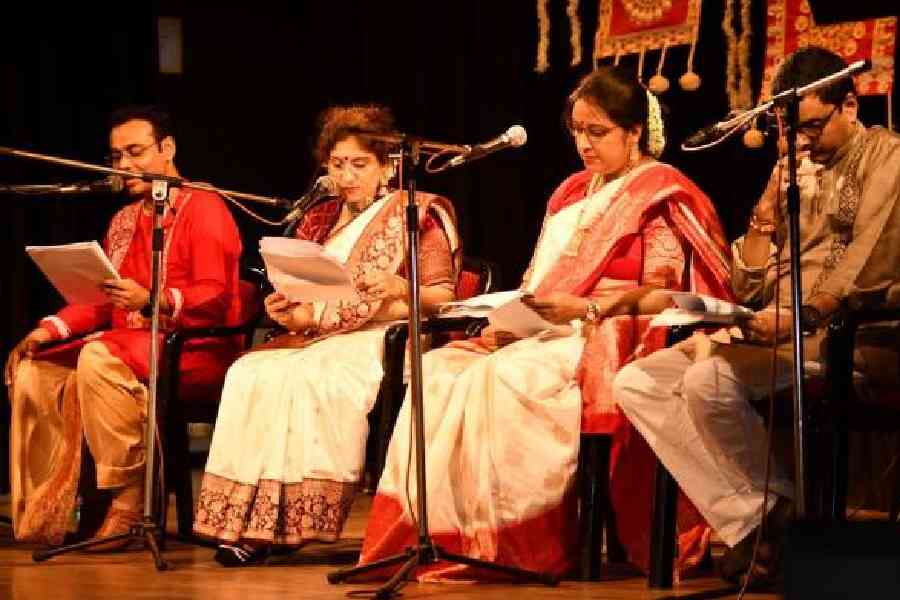If you loved Anjan Dutt’s audio drama Priyo Bandhu back in the 90s, you would be amused to know that a CJ Block-based recitation group Dhwani recently presented its sequel of sorts, at Rabindra Okakura Bhavan recently.
“Priya Bandhu was a cult audio drama about the letters sent back and forth between a man and a woman. This year marks 25 years of that cassette and so we wanted to reprise it,” said Sangita Saha, a resident of CJ Block and founder of Dhwani.
The new play was written by Neelanjan Ghosh and enacted by Saha and elocutionist Amit Chottopadhyay, both of whom had organised the show too. The music that supported the dialogue, with songs like Amar bhitoro bahire and Bondhu tomar pother, was selected by Amrita Sarkar and sung by Sudeshna Bhattacharya and Amit Kali.
As in the original version, the two characters in the play are named Arnab and Jayeeta, but they don’t write letters. “The storyline is different and we’ve set them in the early 2000s. So they connect over landlines, then graduate to Orkut, Facebook, and the like,” smiled Saha.
The show was held on World Music Day and despite the plethora of events around town, drew a big audience. “We have, in fact, already got two invitations to perform Priyo Bandhu 2 during the Pujas,” she added.
Sushmita Dutta had come to watch the show from Kestopur and was spellbound. “I have heard the original Priyo Bandhu but ‘seeing’ it today was a whole new experience, even if it was still an audio drama. The presentation was professional and the dialogues and music conjured vivid visuals in my mind. I got goosebumps,” she said.
But that’s not all. The show also celebrated poet Nirendranath Chakravarty, whose 100th birth anniversary will be celebrated this October. Students of Dhwani like Subhangi Saha of Class IX and Vedanti Burman of Class X recited the poet’s Amalkanti.
There was also a segment on Salil Chowdhury, whose birth centenary would be celebrated in 2025. His poetry was recited, music played and members of a dance group brought it all to life.
Responsible society
Did you think the “SOS” in SOS Children’s Village stood for ‘save our souls’? Well, the audience at the BK Block Village was corrected at their foundation day recently by secretary Amitava Chatterjee.
“SOS stands for ‘societas socialis’, a Latin phrase that translates to ‘responsible society’," said Chatterjee. “This organisation was founded by Hermann Gmeiner, an Austrian soldier who witnessed the horrors of World War II and was concerned about the many children who had got orphaned. Today the network has expanded to over 500 villages across in world.”
The celebration that day was on Gmeiner’s 105th birth anniversary.
In BK Block, the centre started in 1977. Instead of tall buildings, it has 15 bungalow-style houses occupied by six children each and “mothers”, who are appointed to look after them.
Director Nipuna Sen said they have nearly 100 children in their care. “Children come here from all kinds of backgrounds and we often conduct a bridge course for them so they can integrate with regular schools. They are supposed to be with us till they turn 18 but we try to keep them till 23 so they complete higher education and get jobs by then,” Sen said.
The chief guest for the event was Gautam Mohan Chakrabarti, former commissioner of Calcutta Police. He praised the children’s effort and that of the management’s. “Laws are in place to ensure the safety of vulnerable children but one cannot undermine the role of a family. Children need love, which this Village provides,” he said.
The kids performed dances and recited for the audience and most of the events were geared towards raising environmental consciousness.
“Three of us recited Koto din bhabe phool from Tagore’s Sahaj Path. We were taught by Sonali ma’am (Sonali Das, vice president of the Village’s board) in person and over the phone,” said a Class IV boy. Child protection laws do not allow the home’s children to be named or photographed. “My favourite flower is the rose and I admire them wherever I see one in bloom,” he said.
A big production was One Family One Future, that brought together 36 kids. It was choreographed by Sreeradha Paul and the voiceover, from Tagore’s Gitanjali, was by Das’s daughter Sohini Das Hartmann.
“While directing this piece, we found many children surprised at getting selected. They had thought only the four or five best dancers would get to perform but we wanted everyone to enjoy the limelight,” said Paul. The act was about environmental awareness as well as fighting violence against women.










